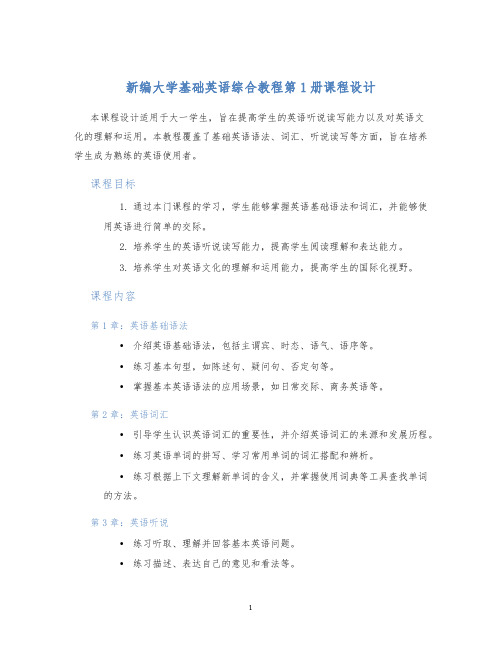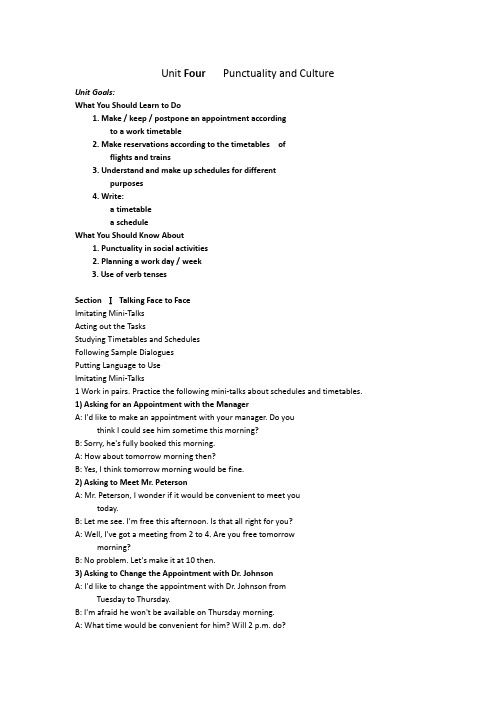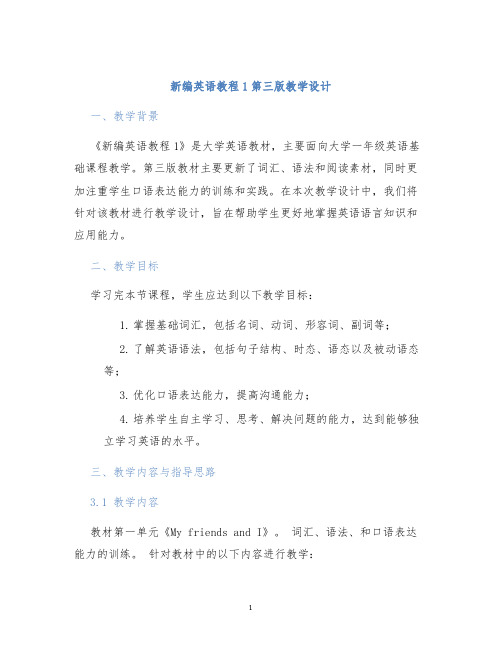新编英语教程第一册电子教案
新编大学基础英语综合教程第1册课程设计

新编大学基础英语综合教程第1册课程设计本课程设计适用于大一学生,旨在提高学生的英语听说读写能力以及对英语文化的理解和运用。
本教程覆盖了基础英语语法、词汇、听说读写等方面,旨在培养学生成为熟练的英语使用者。
课程目标1.通过本门课程的学习,学生能够掌握英语基础语法和词汇,并能够使用英语进行简单的交际。
2.培养学生的英语听说读写能力,提高学生阅读理解和表达能力。
3.培养学生对英语文化的理解和运用能力,提高学生的国际化视野。
课程内容第1章:英语基础语法•介绍英语基础语法,包括主谓宾、时态、语气、语序等。
•练习基本句型,如陈述句、疑问句、否定句等。
•掌握基本英语语法的应用场景,如日常交际、商务英语等。
第2章:英语词汇•引导学生认识英语词汇的重要性,并介绍英语词汇的来源和发展历程。
•练习英语单词的拼写、学习常用单词的词汇搭配和辨析。
•练习根据上下文理解新单词的含义,并掌握使用词典等工具查找单词的方法。
第3章:英语听说•练习听取、理解并回答基本英语问题。
•练习描述、表达自己的意见和看法等。
•练习不同语音语调的模仿,提高听说的流利度。
第4章:英语阅读•练习阅读英语短文、新闻等,理解文章的主题、大意和细节。
•掌握阅读技巧,如寻找关键词、预测文章内容、注意上下文等。
•练习根据文章内容回答问题,培养学生的阅读理解能力。
第5章:英语写作•练习英语写作技巧,包括句型、段落结构和语法等。
•练习表达自己的思想和观点,如写作日记、个人陈述等。
•练习写作常见类型文章,如求职信、邀请信等。
教学方法本课程采用多种教学方法,包括听讲、阅读、写作、讨论、演讲等。
教师将会提供丰富的教学材料,如教科书、音频、视频、练习册,通过交互式教学,培养学生的英语听说读写能力。
评估方式学生的学习成果将通过考试、练习、作业等方式进行评估。
具体评估方式包括:1.阅读理解测试:检测学生阅读理解能力,学生需要根据文章回答相关问题。
2.语音语调测试:测试学生的语音语调模仿能力,学生需要模仿不同语音语调。
《新编大学实用英语英语教程》(林立总主编)第一册教案

教案课程名称大学英语1教案书写规范与要求一、以每次课为一个备课单元书写。
二、每一备课单元书写下列内容:1.周次、课次、授课时间、章节名称;2.简要说明:教学目的、重点、难点、教学方法和授课手段(包括与课程相关的上机和实验、课件制作等);3.教学主要内容(教案主体)及教学方法手段;4.作业内容。
注:其余授课电子版文件待本课程结束后,交教务处统一刻成光盘存档。
大学英语1 课程授课总体计划书厦门软件职业技术学院教案厦门软件职业技术学院教案厦门软件职业技术学院教案厦门软件职业技术学院教案5 We are surprised at his great __improvement__(improve) in English.Activity 5 Fill in the blanks with the proper form of the words and phrases given in the box.1We got tired of his _endless_ boring speech.2 _Chatting_with friends is a good way of relaxation.3 Our country is rich in natural_resources__.4 Upon arrival,the singer are surrounded by a lot of fans and reporters.5 Tom _spends a lot of time in playing computer games every day.6To my surprise,only a third of the students in my class are interested in skiing.7He seems so quiet,but _actually he likes talking.8These days all the college students are very busy,especially the seniors.9 I sent her a bunch of flowers as a (an) expression of gratitude.10 Our college offers an excellent art program .Step II Grammar代词(Pronouns)一代词的分类二代词的用法1 人称代词注意:(1)人称代词在比较分句中作主语,用主格;作宾语,用宾格,如:She works harder than I (do).她比我用功。
新编大学英语第一册教案

Unit 1 Personal Relationships1. Preparation (Period 1& 2)Background InformationAll of us are involved in personal relationships. Some of these are related to family, some with fellow students or workers, and others of a variety of types. Most of these are happy, positive relationships, but not all of them. To have a positive relationship a person must invest time and interest in the other persons with whom he is associated. We all understand that our feelings and interest in other persons depend somewhat on what we have in common. Good relationships are usually valued because people who have good relationships are happier and more fun to be with.1.1 What kinds of relationship are you involved everyday?Can you complete the pairs of words about personal relationships?parent —host —husband —boyfriend —teacher —clerk —doctor —driver —employer —buyer —writer —performer —lawyer —director —policeman —interviewer —Eg: twins, family, couple, cousin, sisters, colleagues, leaders and audiencesisters and brothers, lovers, friends, neighbors, colleagues, schoolmates, fellow workers,…Are they important for your daily life or study? Why? List one example and explain it.1.2 Of all the relationships, which one do you think is easier to be established at the beginning of your college life? Why?A StoryListen to a short story and complete the following sentences:1. The story took place at the time of ______________________________________.2. The relationship between the woman and the little boy is _________.3. The woman led the little boy into the store because ______________________________.4. The woman bought the boy______________________________.5. ―Are you God…‖ here means ____________.原文:They came back outside into the street and the woman said to the child, ―Now you can go home and have a very happy holiday.‖ The little boy looked up at her and asked, ―Are you God, Ma’am?‖ She smiled down at him and replied, ―No, son, I’m just one of his children.‖ The little boy then said, ―I knew you had to be a relative of God.‖Welcome to Our Group!Introducing Yourself to Your Group Members Locationprovince 省 city 市county 县town 镇village 村in the suburbs of 在…的郊区high/middle school 中学key high school 重点中学high school attached to附属中学Personalityfrank 坦率的honest 诚实的outgoing 外向的shy 胆怯的introverted 内向的enthusiastic 热情的Hobbiesstamp-collecting 集邮 sports 运动reading 阅读watching TV 看电视 drawing 绘画photography 摄影 calligraphy 书法traveling 旅游shopping 购物surfing the net 网上冲浪playing cards 打牌fishing 钓鱼like 喜欢be keen on 喜爱prefer 比较喜欢favorite 最爱dislike 不喜欢Discussion in Pairs1. What is your viewpoint of the interpersonal relationships nowadays?2. If you were the woman, what would you do? Try to explain it.3. In our life, some people are open while some others are reserved. Which type do you prefer? Why?Listen to a passage and answer questions:acquaintance 熟人intimate 亲密的harmonious 和谐的t olerate 容忍Questions :1. According to the passage, what is the word ―friend‖?It covers a wide range of meanings as a classmate, a nodding acquaintance, a coworker, etc. 2. Why does everyone need friendship?We need help from, and also give help to, others.3. Why do modern people attach more importance to friendship?As life is full of difficulties and conflict, we need friends to support and help us and give us warnings against danger.原文We Need FriendsThe word, ―friend‖, covers a wide range of meanings. It can be a nodding acquaintance, a classmate, a partner, a playmate, or an intimate colleague. Everyone needs friendship. No one can sail the ocean of life single-handed. We need help from, and also give help to, others. In modern times, people attach more importance to relationships and connections. As life is full of difficulties and conflict, we need friends to support and help us. Our friends give us warnings against danger. Our friends offer us advice with regard to how to deal with various situations.Proverbs and SayingsA friend in need is a friend indeed.A friend is best found in adversity.患难见真情。
新编大学英语综合教程第一册unit1教学案(附答案)

Unit 1Personal RelationshipIn-Class Reading The Gift of Life以生命相赠1 炸弹落在了这个小村庄里。
在可怕的越南战争期间,谁也不知道这些炸弹要轰炸什么目标,而它们却落在了一所由传教士办的小孤儿院内。
2 传教士和一两个孩子已经丧生,还有几个孩子受了伤,其中有一个小女孩,8岁左右,双腿被炸伤了。
3 几小时后,医疗救援小组到了。
医疗小组由一名年轻的美国海军医生和一名同样年轻的海军护士组成。
他们很快发现有个小女孩伤势严重。
显然,如果不立即采取行动,她就会因失血过多和休克而死亡。
4 他们明白必须给小女孩输血,但是他们的医药用品很有限,没有血浆,因此需要匹配的血型。
快速的血型测定显示两名美国人的血型都不合适。
而几个没有受伤的孤儿却有匹配的血型。
5 医生会讲一点越南语,护士会讲一点法语,但只有中学的法语水平。
孩子们不会说英语,只会说一点法语。
医生和护士用少得可怜的一点共同语言,结合大量的手势,努力向这些受惊吓的孩子们解释说,除非他们能输一些血给自己的小伙伴,否则她将必死无疑。
然后他们问孩子们是否有人愿意献血来救小女孩。
6 对医生和护士的请求,孩子们瞪大眼睛,一声不吭。
此时小病人生命垂危。
然而,只有这些受惊吓的孩子中有人自愿献血,他们才能够得到血。
过了好一会儿,一只小手慢慢地举了起来,然后垂了下去,一会儿又举了起来。
7 “噢,谢谢,”护士用法语说。
“你叫什么名字?”8 “兴,”小男孩回答道。
9 兴很快被抱到一张床上,手臂用酒精消毒后,针就扎了进去。
在整个过程中,兴僵直地躺着,没有出声。
10 过了一会儿,他发出了一声长长的抽泣,但立即用那只可以活动的手捂住了自己的脸。
11 “兴,疼吗?”医生问。
12 兴默默地摇了摇头,但一会儿忍不住又抽泣起来,并又一次试图掩饰自己的哭声。
医生又问是不是插在手臂上的针弄疼了他,兴还是摇了摇头。
13 但现在,偶尔的抽泣变成了持续无声的哭泣。
第一册Unit 4新编实用英语教程第4版高教社教案

Unit Four Punctuality and CultureUnit Goals:What You Should Learn to Do1. Make / keep / postpone an appointment accordingto a work timetable2. Make reservations according to the timetables offlights and trains3. Understand and make up schedules for differentpurposes4. Write:a timetablea scheduleWhat You Should Know About1. Punctuality in social activities2. Planning a work day / week3. Use of verb tensesSection ⅠTalking Face to FaceImitating Mini-TalksActing out the TasksStudying Timetables and SchedulesFollowing Sample DialoguesPutting Language to UseImitating Mini-Talks1 Work in pairs. Practice the following mini-talks about schedules and timetables.1) Asking for an Appointment with the ManagerA: I'd like to make an appointment with your manager. Do youthink I could see him sometime this morning?B: Sorry, he's fully booked this morning.A: How about tomorrow morning then?B: Yes, I think tomorrow morning would be fine.2) Asking to Meet Mr. PetersonA: Mr. Peterson, I wonder if it would be convenient to meet youtoday.B: Let me see. I'm free this afternoon. Is that all right for you?A: Well, I've got a meeting from 2 to 4. Are you free tomorrowmorning?B: No problem. Let's make it at 10 then.3) Asking to Change the Appointment with Dr. JohnsonA: I'd like to change the appointment with Dr. Johnson fromTuesday to Thursday.B: I'm afraid he won't be available on Thursday morning.A: What time would be convenient for him? Will 2 p.m. do?B: Yes, that'll be fine.4) Asking About the Working Hours of a Ticket OfficeA: What are the office hours?B: Well, the office hours are from 9 a.m. to 6 p.m.A: Do you work on weekends?B: On Saturday the office is open from 9 a.m. to 3 p.m., but on Sunday we are closed.5) Asking About the Flights for MacaoA: Do you have flights to Macao?B: We have only one flight to Macao each week, at 1:40 p.m.Wednesday.A: When does it arrive in Macao?B: At 3:40 p.m.2 Work in pairs and act out the tasks by following the above mini-talks.1 Task:Look at the flight timetable in Exercise 3.Ask about the departure and arrival time2 Task:Look at the flight timetable in Exercise 3.Ask about the Tuesday flight for Hong Kong3 Task:Look at Mark's schedule in Exercise 3.Call to ask Mark for a change of an appointment.4 Task:Look at Mark's schedule in Exercise 3.Ask to make an appointment to see Mark on Wednesday.5 Task:Look at Mark's schedule in Exercise 3.An old friend in Hong Kong asks to see Mark on Thursday.Studying Timetables and SchedulesRead the following sample dialogues and try to perform your own tasks.Putting Language to UseSpeak and CompleteMark: Miss Wang, I want to 1 __________ an evening train to Harbin so thatI can get there the next morning. Do you know the schedule?Miss Wang: Yes. I have got a 2 __________________ here.Mark: Is there a train leaving around 6?Miss Wang: 3 ______________ one at 6:15.Mark: When will it get there?Miss Wang: 4 ______________ at about 8 next morning.Mark: That's the one I need. Thank you very much.Miss Wang: You are 5 ______________.SECTION II Being All EarsLearning Sentences for Workplace CommunicationHandling a DialogueUnderstanding a Short Speech / TalkLearning Sentences for Workplace Communication1 Listen to 10 sentences for workplace communication cross-referenced withtheir Chinese translations.arrange 安排confirm 确认due 规定(到达) 的delay 耽搁2 Listen to the following sentences for workplace communication in Column A andmatch each one with its Chinese version in Column BKey:1-i, 2-j, 3-d, 4-c, 5-f, 6-e, 7-h, 8-g, 9-a, 10-b3 Listen to 6 sentences for workplace communication and choose their right responses4 Listen to a dialogue and decode the message by filling in Susan's scheduleaccording to what you have heard.5 Now listen to a short speech / talk and fill up the blanks according to what youhave heard. The words in brackets will give you some hints.6 Listen to the speech / talk again and complete the information in Column A withthe right choices in Column B.SECTION III Trying Your HandPracticing Applied WritingWriting Sentences and Reviewing Grammar1 Fill in the office hours making use of the information in the passage that follows.2 Translate the following schedule into English, using the data bank in theWorkbook for reference.Writing Sentences and Reviewing Grammar3 Complete the following sentences, using the right verb forms4 Correct the errors in the following sentences.5 Translate the following sentences into English6 Suppose this is your schedule for the coming three days. Write a paragraph ofabout 100 words based on the information given in the schedule. You maystart the passage with the sentence: I've got a very busy schedule.KEYS: I've got a very busy schedule. I'm catching the 9:45 flight on October 8 and arriving in Shanghai at 2:00 in the afternoon. Bob is meeting me at the airport. I will check into Beach Hotel and have a rest there in the evening. On October 9, I'm meeting Mrs. Black at 10:15 a.m. and after having lunch at Beach Hotel we're visiting the plant at 2:30 p.m. The next day I'm attending a conference at 9 a.m. I'm leaving Shanghai in the afternoon. I'm taking a flight at 3:30 p.m. and arriving back at 7:45 p.m. Phillip will be there to pick me up at the airport.SECTION IV Maintaining a Sharp EyeInformation Related to the Reading PassageAmericans and Europeans consider time to be an asset that can be spent and saved; therefore, proper scheduling of time and its appropriate allocation to various competing tasks is an important part of organizational management. Variations in time use are expected to influence performance and stress, as well as other outcomes. It is a vital strategic element. Thelarge amount of management processes and methods developed to improve performance by managing time use proves the importance placed on time. Here are a few famous quotes and sayings about time and punctuality:1 Explanation of Difficult Sentences1. (Para. 1) One of the cultural differences that tend to annoy Americans has to dowith understanding of punctuality.Analysis: Has to do with is a phrase meaning has a specified relationship with.It is the predicate of the sentence. That introduces a restrictive relativeclause modifying differences.Translation:有一种常会惹恼美国人的文化差异可能关系到对守时的不同理解。
新编大学基础英语综合教程第一册教案

教学方式、手段、媒介:
教学方式(Teaching method):
1. lecture
2. role play
讨论、思考题、作业:
1. Organize the students into groups to complete theinformationfor your group members as well as yourself, which may include:
Then ask one student from each group to report the results of their interview.
efulExpressions:*
1) at a wedding
2) at a disco
3) on holiday
4) be/come from
5) hi, there
6) date of birth
7) in lower case
8) in capitals
2. Language Focus on?
Reading
Understand short texts describing jobs and morning routines and read a snack bar menu.
Language quality
Use determiners and possessive pronouns, the Present Simple.
2. Assign the exercise after the text.
新编英语教程1第三版教学设计

新编英语教程1第三版教学设计一、教学背景《新编英语教程1》是大学英语教材,主要面向大学一年级英语基础课程教学。
第三版教材主要更新了词汇、语法和阅读素材,同时更加注重学生口语表达能力的训练和实践。
在本次教学设计中,我们将针对该教材进行教学设计,旨在帮助学生更好地掌握英语语言知识和应用能力。
二、教学目标学习完本节课程,学生应达到以下教学目标:1.掌握基础词汇,包括名词、动词、形容词、副词等;2.了解英语语法,包括句子结构、时态、语态以及被动语态等;3.优化口语表达能力,提高沟通能力;4.培养学生自主学习、思考、解决问题的能力,达到能够独立学习英语的水平。
三、教学内容与指导思路3.1 教学内容教材第一单元《My friends and I》。
词汇、语法、和口语表达能力的训练。
针对教材中的以下内容进行教学:1.人称代词和物主代词的使用;2.简单时态(现在时、过去时以及将来时)的使用;3.动词的被动语态;4.多种句子结构的使用;5.常用的日常英语口语表达。
通过多种学习方式,全面提高学生英语语言综合素养和应用能力,达到英语语言沟通的基本要求。
3.2 指导思路1.提高学生的学习兴趣,增强学习主动性和积极性。
通过小组讨论、课堂问答、真实场景模拟等方式,让学生感知英语语言的巨大魅力,提高主动学习的意识。
2.基于学生的实际掌握水平,采用多种教学手段。
无论是针对词汇的阅读训练、语法知识的梳理与模拟训练,还是口语交际能力的提升,本次教学肯定有多种形式的练习活动。
3.系统性地传授英语语言知识,严格把关学习效果。
逐步推进解题思路,梳理重点难点知识体系,切实提高学生英语语言的全面分析及解决问题的能力。
三、教学过程3.1 教学方法采用多种教学方法:1.讲授;2.互动交流;3.问答;4.课外练习。
3.2 教学流程第一步:引入通过一些真实的英语场景让学生感受到英语语言实际应用的价值。
第二步:阅读理解通过阅读教材,让学生掌握重要词汇和英语语言的基础语法知识,并通过练习巩固记忆。
新编大学基础英语综合教程第一册教案

新编⼤学基础英语综合教程第⼀册教案本科课程教案2017-2018 学年(第 1 学期)课程名称:⼤学英语CI课程性质:□通识必修课□⼤类基础课□专业核⼼课□专业拓展课□通识限选课□通识任选课授课班级:17产品设计1班(32⼈)、环境设计七班(30⼈)学⽣数:共62⼈授课教师:庞海才学分/学时:6/75学时分配:理论讲授学时,课堂讨论学时实验/课内实践学时,在线学习学时课程设计(周)系(教研室)负责⼈(签名):主管教学院长(签名):审核通过⽇期:年⽉⽇Unit 4 What’s On?I.教学⽬标ObjectivesStudents will be able to:Talk about free time activitiesMatch descriptions to photosIntroduce and practise the use of the -ing verb form after go, like and love Use expressions of frequency to talk about habits in a quizII. 课时安排Time Allotment(体现重点、难点)1st period:Lesson 1)2nd period: Lesson 23rd period: Lesson 34th period: Lesson 4III. 教学⽅法与⼿段Teaching MethodologyStudent-centered approachStudent-centered learning requires students to be active, responsible participants in their own learning. Instead of lecturing through the whole class, the teacher t akes students interests into account, follows their passions, capitalizes on their strengths and helps students form a strong learning community.Task-based approachThe main aim of this approach to learning is task completion. Usually, relevant and interesting tasks are set by the teacher and students are expected to draw on their pre-existing knowledge of English to complete the task.IV. 教学内容及过程Tasks and ProcessLesson 1 Time OutLexical PreparationVocabulary &Listening1. Work in pairs. Find phrases to describe the photos below.Key:a. I go swimming.b. We go to concerts.c. We go rollerblading on the seafront.d. I sit in a café and read the paper.e. We spend hours playing computer games.f. I work out in the gym.2. Work in pairs. Look at the above list and ask your partner: What do you do in your freetime?3. Listen to Nikki and Martin answering the same questions. Tick the activities they mention.4.Listen again. Match the answers to the questions and write the name of the person who’s speaking (Nikki or Martin). Questions:1. What do you do in your free time?2. What do you like doing on Sundays?3. How often do you go to concerts / the cinema?Lesson 2 Going OutSpeaking1. Work in pairs. Match the questions with the answers.2. Ask your classmates the questions. Find the person who is most similar to you.Listening1. Listen to a telephone conversation and answer the questions.1. Are the two people friends?a) yes b) no2. Where is the woman?a) at home b) in the office c) in the street3. Is she busy?a) yes b) no4. Why does the man phone the woman?a) to talk about workb) to invite her for a drinkc) to ask for help2. Match the questions and the answers.1. Are you busy? a) I’m visiting some friends.2. What are you doing? b) I’m in the office.3. What are you doing here? c) I’m writing a report.Listen and check.Practice4. Listen to their mobile phone conversations. Are they telling the truth?Conversation 1 Conversation 2Conversation 3 Conversation 45. Complete the dialogue. Listen and check.1. A: Hi, ______ you working?B: No, I _______. ______ having a drink with a friend .What ______ you doing? Are you busy?A: No, I _______.B: Well, come and have a drink with us!2. C: Hi, ______ you watching the football?D: Yes, I ______. ______ watching it with some friends in the pub.C: _______ Rob watching it with you?D: No, he _______. He’ s doing some work at home.6. Match the dialogues with two of the photos.7. Work in pairs. Write similar dialogues for the other two photos. Practise reading them with your partner.8. Translate the following sentences into English.1. 玛丽亚的母亲正在打扫客厅Maria’s mother is cleaning the sitting room.2. —孩⼦们在做作业吗?—不, 他们在踢⾜球。
- 1、下载文档前请自行甄别文档内容的完整性,平台不提供额外的编辑、内容补充、找答案等附加服务。
- 2、"仅部分预览"的文档,不可在线预览部分如存在完整性等问题,可反馈申请退款(可完整预览的文档不适用该条件!)。
- 3、如文档侵犯您的权益,请联系客服反馈,我们会尽快为您处理(人工客服工作时间:9:00-18:30)。
Teaching PlanOf A New English CourseStatementBook IUnit 1Time AllotmentSection One Duty Report, Language Structures & Dialogues (100 minutes)Section Two Duty Report, Readings (100 minutes)Section Three Duty Report, Exercises (100 minutes)Main Tasks:I. Grammar1. The simple past and the present perfect contrasted2. The past progressive3. The past perfectII. Communicative skills1. Asking for/giving information about somebody’s (first, second, last, etc.) visit t o a certain place;2. Asking for and giving information about what was going on in two different classes at the same time in the past;3. Asking for and giving information about what was going on at a certain time in the past;4. Giving information about actions completed before a certain time in the past/before another action in the past;5. Introducing yourself and responding to an introduction when you are introduced.III. Useful words and expressionsIV. Note-writing: Note of introductionV. Use of transitionsDetailed Teaching Points and Suggested Teaching Procedures:Section One Language Structures & DialoguesI. Grammar review1. Simple past and present perfect tenseVerbs in sentences beginning with “This is the first/second… time are in the pres ent perfect form. For example,This is the first time I’ve been in Xi’an.This is the second time I’ve seen this movie.2. Past progressive tensePast progressive is a combination of the progressive aspect with the past tense. The use of the past progressive has much in common with that of the present progressive, only the time reference being pushed back to the past, often overtly expressed by a time –when/while adverbial. For example,Susan was washing her hair while her mother was cooking.Dick was changing a flat tire while his father was mowing the lawn.3. Past perfect tenseFor the past perfect tense we set up an additional focal point in the past and say that another act was completed before that time. For example,Greg had finished his work when I visited him.The chair had collapsed before I sat on it.II. DialoguesHave the students listen to the recording of Dialogue I once or twice and ask them questions on specific details.Go through the dialogue and explain some language points:1. You know what?– This question is used to introduce a piece of information which is surprising. A similar expression is Guess what?.2. scenic spots– places of natural attractive scenery3. I was greatly impressed by its natural beauty. – I was moved by its beautiful scenery. impress– to influence deeply, esp. with a feeling of admiration: The students were impressed by his inspiring speech. / We are impressed by his performance.4. I bet you had lots of fun there. – I am certain you had lots of fun there. Another example, I bet (that) it will rain tomorrow.5. It brought back such sweet memories. – Sweet memories came to my mind. bring back– to cause to return to the mind: Hearing the song brought back happy memories.6. You remind me of my last trip there. – It seems to be similar to my last trip there. remind sbdy.of sbdy./sthg. –to appear to be similar to; to cause to remember : This museum reminds me of the one we visited last year. / The event reminded me of my school days.7. I wish I had been there with you this time.– This is a wish about a non-fact in the past. Another example, I wish I had passed the exam.8. hobby groups – different groups of students classified by hobbies.9. Some staged an exhibition. – Some held an exhibition. stage– to perform or arrange for public show; put on: The art group is going to stage an art show on Sunday.In-class Activity1. Ask the students to read Dialogue I aloud in pairs with feeling and expression.2. Ask the students to listen to Dialogue II and then retell it.Homework:1. Work in pairs to practice the situation in each dialogue.2. Work in groups to discuss the topic of “How I spent the summer vacation”.3. Have the students form their own dialogues by using the phrases from Dialogues I & II.4. Do the corresponding exercises in WB.Section Two ReadingsHave the students read the passage first and do the corresponding exercise in workbook. Then the teacher may ask them questions in class to check their comprehension.I. Useful words and expressions:1.Herbert went to France for holiday. –For is an preposition used here to show purpose: I came to this building for an interview. / What is this handle for?2. run out of–to use all one’s supplies, to have no more: I am afraid we’ve run out of sugar.3. expect –to think or believe (that something will happen): I expect that she will come to our party. /The spokesman is expected to make an announcement later on today.4.The back door burst open. – The door opened suddenly. burst – to come into the stated condition suddenly and often violently: In spring the flowers burst open. /He burst free from the chains. Another similar use of the pattern: The door banged shut.5. peer at– to look very carefully or hard, esp. as if not able to see clearlypeek at– to take a quick look at something when one should notpeep at– to look at something quickly and secretly, esp. through a hole or other small opening6. convince– to make (someone) completely certain about something; persuade: They failed to convince the directors that their proposal would work. / I am convinced by your story.7. a sound sleeper– a deep sleeper8. to thumb a ride/lift–to ask passing motorists for a free ride by holding out one’s hand with the thumb raised9. made his way in the dark – went in the dark: He made his way home.10. He was not supposed to be back. – He was not considered to be back. Be supposed to – to be intended to; tobe generally considered to be; to have the regulation of being: The volunteers are supposed to help the blind in the street. /I haven’t read this novel, but it is supposed to be a good one.11. to keep an eye on – to watch carefully: I often ask my neighbor to keep an eye on my house while I am away.12. was about to – This construction expresses the immediate future in the past. In some contexts, it is often used in the sense of an unfulfilled intention. For example,I was about to leave when he came to visit me.II. Note-writingNotes must be precise and direct; however, the style is casual. In notes of introduction, the following are usually included:1. The name of the person to be introduced2. His/Her identity3. The purpose of the introduction4. AppreciationIII. Use of transitionsTransitions, or linking words are words that join one idea to another idea. Transitions add coherence to writing by joining ideas together. They help a writer form bridges from one sentence to another. The reader crosses the bridge by connecting one sentence to another, if the transitional words are good ones. Have the students discuss the alternatives for each blank in Guided writing and help them distinguish one connective from another.Homework:1. Guided writing2. Exercises in WB3. Interaction activitiesSection Three ExercisesCheck the exercises and explain the difficult points in them.Unit 2Time AllotmentSection One Duty Report, Language Structures & Dialogues (100 minutes)Section Two Duty Report, Readings (100 minutes)Section Three Duty Report, Exercises (100 minutes)Main Tasks:I. GrammarThe nominal clause used as the object, introduced by1. if2. wh-word3. thatII. Communicative skills1. Asking for and giving information about a future event2. Asking for and giving information about a past event3. Expressing one’s inability to answer a question and recommending somebody else to give the information4. Asking for and giving information of the truth of an event5. Expressing agreement6. Finding the wayIII. Useful words and expressionsIV. Note-writing: note of introductionDetailed Teaching Points and Suggested Teaching Procedures:Section One Language Structures & DialoguesI. Grammar reviewInstead of using a noun with modifiers to function as an object, we may use a nominal clause:Do you know if there’s a lecture this afternoon?Everybody knows that money doesn’t grow on trees.Note that the connectives used in the two sentences are different. In the first sentence, the object clause is originally a yes-no question, i.e., “Is there a lecture this afternoon?” When a yes-no question is turned into an object clause, the connective if is used and the word order of the question changes a little. In the second sentence, the object clause is a statement. When a statement is turned into an object clause, the connective that is used and the word order of the statement does not change. The connective that is often omitted in short and informal sentences.II. Language Structure PracticeIn-class Activity OneAsk the students to fill in the gaps in each dialogue while listening to the recording and then do the substitution exercises.Useful words and expressions:1. I don’t think he does. – When think is used to introduce a negative idea, the negative particle not is not used in the subordinate clause; instead, it comes back before think. Other verbs used in the same way are: believe, suppose, imagine, etc., e.g., I don’t believe that John knew the truth.2. what for– why, for what purpose: I will go to Shanghai next week. – What for? /What is he coming to the meeting for?3. high jump – a sport in which someone makes a jump over a bar which is gradually raised higher and higher跳高Other sport events:long jump/broad jump 跳远triple jump三级跳远sprint 短跑, walking race 竞走hurdles 跨栏400-metr relay race 400米接力赛marathon马拉松赛跑100-meter dash 100米赛跑1500-meter race1500米赛跑DialoguesHave the students listen to the recording of Dialogue I once or twice and ask them questions on specific details. Go through Dialogue I and explain some language points:1. resort – place where people regularly go for holidays2. besides –in addition; also: I don’t want to go; besides, I am too tired. Usage: Compare besides and exce pt. Besides means as well as. Ten of us went to the party besides John. (=John went there too) Except means but not or leaving out. All of us went to the party except John. (=John did not go there)3. It all depends. – It has not yet been decided. When there is no definite answer to a question, one usually says, “It depends.” or “That depends. “, meaning that the question can only be answered on certain conditions.4. a trade-off– a balance between two opposing situations or qualities, intended to produce an acceptable or desirable result: In order to keep prices low, there has to be a trade-off between quality and quantity.5. a john –American slang for “toilet”. A British equivalent is “a loo”.6. incidentally– by the way. Incidentally is used here to indicate a shift to another subject.7. a package tour –a completely planned tour or trip at a fixed price arranged by a travel agency, which includes travel, hotels, meals, etc.8. Constant dripping wears away a stone. –水滴石穿。
